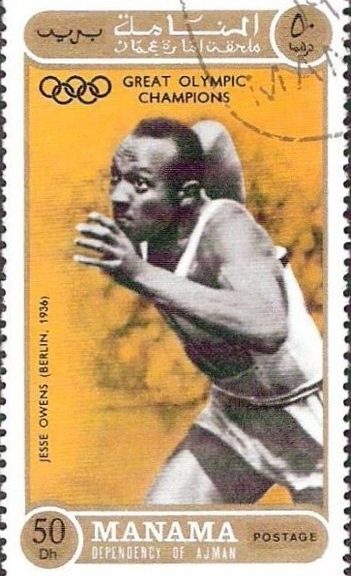Adolf Hitler wanted the 1936 Berlin Olympics to be a coming out party for his Aryan Master Race. Jesse Owens crashed the venue by winning four gold medals.
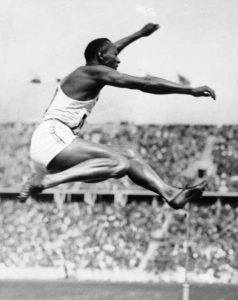
Owens then had to hustle to the long jump competition which also began at 10:30 AM. Here he faced an athlete from Germany who was his first formidable foreign competition, a 22 year old German; Carl Ludwig “Luz” Long. Long was the current German and European record holder, not quite Owens equal but certainly dangerous if Jesse should falter. And, proving that he was human, Jesse did initially stumble during what should have been an easy qualification. He was charged with his first of three jumps when he typically jogged on the runway and through the landing area just to get a feel for the surface. This American warmup practice was unknown in Europe and despite even the head coach of the American track and field contingent getting into the face of the officials, the practice jump counted. The incident seemed to rattle Owens, his second jump was only 23 feet, 3 inches, short of what he needed to qualify for the next round and more than three feet shorter than his own world record.
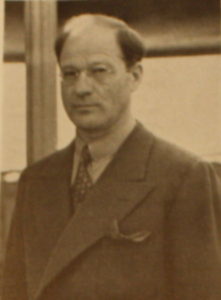
Conversely, and fortunately from Nazi Germany’s perspective, the head of the American Olympic Committee, Avery Brundage, was adamantly opposed to any interference in American Olympic participation due to politics. Brundage, a wealthy and dictatorial administrator, once famously stated that the Olympic Games belong to the athletes and not to the politicians. He officially travelled to Germany to assess the situation and after a series of carefully choreographed interactions with German officials, he was able to convince the IOC to agree to US participation.

Although he was due to run in the finals of the 200 meters on Wednesday, August 5, Jesse Owens tried to throttle back some of the intensity of the previous 48 hours. He was already the biggest celebrity of the Olympic games and despite his attempt to sleep late on Wednesday morning, his brick guest house swarmed with fans and even athletes crowding around the windows trying to get a glimpse of the American track star.
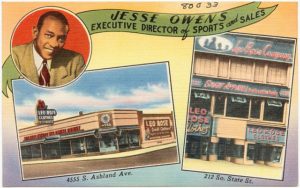
Jesse would have to hustle for the next few years to make a living with more barnstorming tours and various promotional gigs associated with black clothing stores and dry cleaning establishments.
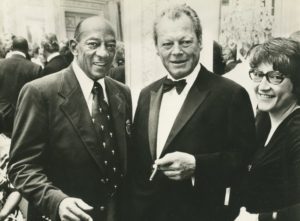
1972 also brought another Olympics, this the ill-fated games at Munich which involved the terrorist murder of 11 Israeli Olympic athletes. Despite this tragic event and in spite of some controversy over whether the games should continue they did and Jesse Owens got caught up in mediating another racially charged situation.
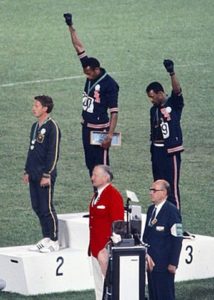
Jesse Owens travelled to the 1968 Olympics as a guest of the Mexican government, a consultant to the US Olympic Committee and a radio commentator for the Mutual broadcasting network. Although Owens must have been astonished when long jumper Bob Beamon broke the existing world record by almost two feet, much more impactful was a coordinated protest by two black track athletes, Tommy Smith and John Carlos. Winning gold and bronze respectively, in the 200 meters, while on the victory podium the two athletes raised their black gloved fists during the playing of the American national anthem. While the protest caused a media sensation that reverberated around the world, it prompted great anger from the US Olympic committee and especially Avery Brundage, still the President of the IOC. Owens was sent to meet with a group of athletes to attempt to mitigate the situation and possibly extract a face-saving apology before the IOC punished anyone. He failed miserably to even get any white participants to leave the meeting, the consensus that they supported Smith and Carlos more than he did. Sadly, the lengthy session deteriorated into anger and recriminations. The next day the IOC kicked Carlos and Smith out of the Olympic Village and suspended them from Olympic competition. When questioned as to why it was acceptable for Germans to use the Nazi salute on the victory stand, but that Smith and Carlos’ behavior was unacceptable, Avery Brundage actually replied that the Nazi salute was the accepted national salute in the country in that time period.
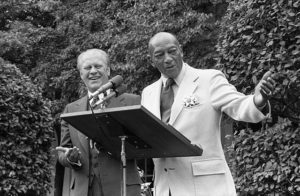
Jesse Owens spent the next eight years doing what he had done for some time, public speaking. By now, he would enthrall audiences with yarns about being personally snubbed by Hitler and the help he received from Luz Long and other tales, occasionally admitting to particularly determined journalists that these stories were embroidered so that “people got to hear what they wanted to hear and I got paid for telling them.” He received an honorary degree from Ohio State, awards from the NCAA, induction into the track and field Hall of Fame, the Medal of Freedom from President Gerald Ford and the Living Legends Award from President Jimmy Carter, Owens now perceived as a national treasure without any partisan stigma.
Podcast: Play in new window | Download
Subscribe: RSS

